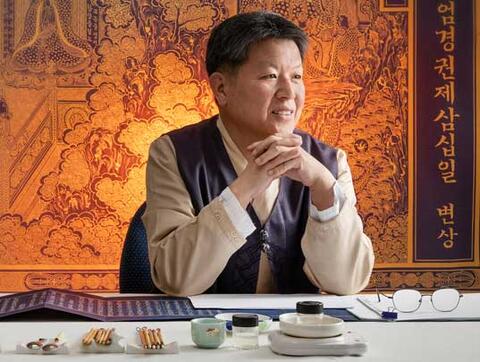This event marks the opening of the new exhibit, “Copying Sacred Scriptures: A Spiritual Practice,” now on view in the Hanke Gallery in Sterling Memorial Library. The event will include an introductory lecture and live Sagyŏng demonstration from Master Dagil Kim Kyeong-ho. A reception will follow at 6:00 p.m.
Master Kim is a poet, calligrapher, and artist who has devoted himself to the continuation of the rare art and technique of Sagyŏng (Buddhist sutra transcription) for the last 30 years.
He is the author of An Introduction to Sagyŏng, the first unique publication on Sagyŏng in the modern times in Korea. He holds an M.A. in Art History from Dongguk University, and in 1997, he won the Grand Prize in the first-ever Buddhist Scripture Transcribing Contest co-organized by the Jogye Order of Korean Buddhism and Eastern Calligraphers’ Association.
Master Kim has presented numerous solo exhibitions, including 15 shows organized by the Korean state. He has also taught traditional Sagyŏng at the universities, Buddhist television channels, and Dong A Cultural Center. He has been numerously invited by prestigious organizations to give special lectures and demonstrations. Over decades, he has contributed numerous essays of his Sagyŏng research to various Buddhist magazines. Furthermore, he has advised and participated in numerous national heritage research and restoration projects.
As the highest authority in Sagyŏng, Master Kim serves as the President of the Korean Transcribed Sutra Research Association. Currently he is developing a new style of Sagyŏng, incorporating strengths of The Book of Kells in Celtic Christianity and The Shahnama of Shah Isma’ll (The Book of Kings) in Islam in an attempt to share Sagyŏng with a wider audience.
This event is co-organized by the Council on East Asian Studies and the Library and is generously funded by the Glorisun Global Network for Buddhist Studies.
